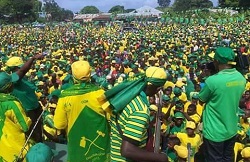With election results declared the ruling Chama Cha Mapinduzi Party (CCM) has held off a challenge from an opposition coalition on the Tanzanian mainland, and John Magufuli declared to be the new President.
But the semi autonomous Zanzibar has been plunged into crisis after the Chair of the Zanzibar Election Commission halted the counting process and declared the election void. The 2010 election was settled by just 1% of the vote, with accusations of malpractice against the ruling CCM. To preserve the peace CCM and rivals the Civic United Front (CUF) had concluded a power sharing agreement with Government posts allocated according to share of the vote.
Traditionally CUF, members of Liberal International, have been supporters of greater autonomy, and independence for Zanzibar. The possibility of oil in Zanzibar waters prompted discussions with the Tanzanian Government about how oil revenues would be distributed, CUF arguing that Zanzibar has not benefited from Tanzanian oil finds outside Zanzibars waters and that Zanzibar should receive the revenues from Zanzibari oil.
That was certainly one reason for increased support for CUF and during my visit to Zanzibar in September. I met a number of former CCM officials who had defected.
Seif Sharif Hamad, the CUF Presidental candidate for Zanzibar was expelled from the ruling party in the days before multi party democracy and was imprisoned without trial for two and a half years. He has been the CUF candidate in elections since a multi party system was introduced, but aged 72, this is widely regarded as his last chance. He was Vice President during the last five years under the power sharing agreement.
International observers were satisfied with the election and it is clear that the annulment occurred as it emerged that CUF would win. The decision seems to have been made by ZEC Chair Jecha Salem Jecha without consulting other ZEC members – there were reports of fist fights between members of the commission when Jecha’s intentions became clear. The reason given was voting irregularities, although Zanzibari votes in the Tanzanian election were accepted and included in the overall results. It is not clear whether the ZEC has the legal right to annul an election.
Protests have been made by the EU, USA, UK, International Observers and the East African Community. ZEC has been asked to clarify the details of alleged irregularities. Both the Zanzibar Law Society and Tanganyika Law Society have said that the annulment was illegal. CUF has appealed for calm, in a part of the World in which violence has been a frequent accompaniment to elections.
If, as seems certain, this is an attempt by the CCM to remain in power by manipulating the results, it is likely to backfire in the long run. Already there are growing calls for independence from Tanzania.
Although politics in Zanzibar are not overtly tribal, there is an historical context which CUF has among its ranks many of the old trading families from the Sultanate, with historic links to slavery and oppression of the ‘African’ community and CCM the successor of the revolution that overthrew it, committed acts of vengeance and, in the minds of some of its older leaders, will not surrender power back and see the union of Tanzania as a guarantor of their security. Their fears may be more imaginary than real, and felt less by a younger generation, but national reconciliation is needed.
It is widely believed that CUF, while losing narrowly to CCM in every previous election, actually should have won them all.
The whole of Tanzania voted on the same day. CCM which has ruled Tanzania continuously was thought to be facing a serious challenge in the National election, as four major opposition parties united against them. The Party was also rocked by corruption scandals and internal conflicts. Edward Lowassa, who had hoped to be the CCM Presidential candidate, defected to the opposition after being edged out of the selection process.
Lowassa, a former Prime Minister, had given retiring President Kinwete support over the years, but was tainted by allegations of corruption and displayed inappropriate wealth. Kinwete, aware of the dangers of being seen to be supported by Lowassas business contacts decided instead to support his friend and distant relative Bernard Membe as candidate.
Under CCM rules the 38 prospective candidates should be vetted by the Ethics and Security Committee of CCM. The committee only approved 5 names including Membe, and excluding Lowassa. Lowassas supporters campaigned to stop Membe, with John Magafuli being elected as candidate, seemingly by accident.
Lowassa immediately defected to the opposition and was adopted as their Presidential candidate. Lowassa is a likeable person and probably the most popular politician in Tanzania. He brought some supporters with him from the CCM, although some opposition members left the coalition in disgust.
The united opposition was formed of four parties. Their programmes differed – Chedema, the largest, is a conservative party, while the second largest the Civic United Front (CUF) is a member of Liberal International. What brought them together was a shared interest in ending the CCM’s monopoly over power and ending the corruption that has dogged CCM.
The irony is that while the charismatic Lowassa is tainted by corruption allegations, Magufuli has a reputation as a diligent hard working and honest political lightweight with a track record of delivering the goods. At campaign rallies, both candidates have made some ambitious promises, but Magafuli has been able to point to a record of delivering results.
There is a feeling that the CCM is in gradual decline. Its vote has dropped in successive elections. As the Taganyika African National Union (TANU) it led Tanzania to independence and it commands the respect of older voters as well as having power bases in rural areas and among women. But Tanzania is a young country and its youth don’t revere CCM because of its historic role.
Regardless of whether Magufuli will be able to bring about the changes that Tanzania needs, CCM will need to broaden its appeal to young people. Seven, mostly ageing, Ministers lost their seats in the election, so in Tanzania as well as the semi autonomous Zanzibar, the political future will have a different feel about it.

